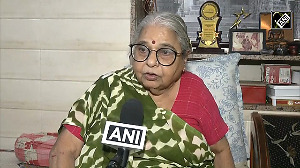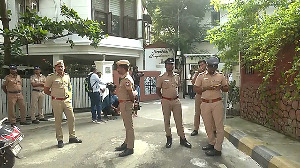This day last month, India's incompetence was on display. Pakistan-based terrorists or Pakistan army-backed groups or whatever you call them, had hit India so badly that every Indian found it humiliating. And when facts nailed the simultaneous failure of all its systems, India was truly humbled.
On the one hand India was a victim of the evil designs of evil minds. On the other hand, it was also a victim of criminal negligence; of its failure to react to terror warnings; of the lethargy of its bureaucracy in taking preventive measures to ensure at least minimum safety; of the corroded and out-of-date infrastructure of its external and internal security system.
After the initial shock came a second jolt when it was found that it was just 10 terrorists who had held India's finest forces at bay for 60 hours.
It was an embarrassment for a country that is one of the biggest victims of terrorism in the world and yet does not have a strategy to seize the initiative from the enemy in the first few hours of the attack. The so-called emerging world power looked so vulnerable that the world watched the events unfold in dazed silence.
The third setback was at a different level. The ambitious India-China hyphenation vanished from the public eye and was again replaced with the hackneyed and wicked India-Pakistan hyphenation.
Now, India is seen as an unsafe destination for outsiders, at least in the short-term due to its response. This is also because of the coming unpredictable general election and of the difficult-to-ignore internal differences of all shades.
Against these setbacks in last 30 days, Prime Minister Manmohan Singh has behaved with extra caution; slow and responsibly.
He can be criticised for being slow and may be accused of being out-of-tune with Mumbai's anger and humiliation, but he has ensured that it is still advantage India.
Just one look at what is happening from Iran to Thailand will show India has to tread slowly and carefully. Surely, Dr Singh's words fall short, but his decision to go slow in first month has suited his party, government and country. "If our Sardarji means business we don't mind him taking a little more time," one senior Congress leader, who is among those who believe that Pakistan has to be taught a lesson.
The prime minister's meeting on Friday with the three defence chiefs is an important development. A senior serving diplomat said of it: "The government is moving from inaction to action."
A few other major changes are visible in the reactions of the Prime Minister's Office and the external affairs ministry. India's first official reaction did not allege the direct involvement of Pakistan, its army or the Inter-Services Intelligence. At the official level, only in the last week has the tone changed. India surely has in its pocket some substantial evidence to indict the Pakistan army. Otherwise, Foreign Secretary Shiv Shanker Menon, External Affairs Minister Pranab Mukherjee and now the prime minister would not start mentioning names beyond 'non-State actors'.
On December 23, Dr Singh said at the Heads of Missions meeting: 'India sought peace and stability in its neighbourhood. The situation was however worrisome. Non-State actors were practicing terrorism aided and abetted by State establishments. The Mumbai terrorist attacks were an attack on India's ambitions to emerge as an economic power.'
One does not need any more proof to know that the government is convinced about the Pakistan establishment's role after the PM's speech.
So, the government has actually moved forward in its response to the Mumbai attacks. And in that sense the patience of the past month and the PMO's go-slow attitude is understandable.
A lot may have been written about why a war with Pakistan is inevitable, but a senior diplomat said: "The media need not brand any action of the government as war or lack of action as India's limitations. India should do or not do certain things in its interests." An important thing to note is that nobody in New Delhi thinks that the attack will go without a response.
There are too many ifs and buts in the process of taking any decision and the government is under tremendous pressure.
First, India is looking to neutralise America's apprehensions about India's possible steps and options. At this moment, India will have to ensure that America's stand on the issue remains neutral and certainly does not lean towards Islamabad. That is the biggest challenge.
Second, the smooth transition of power in Jammu and Kashmir is a must and will have to be ensured in the next couple of days.
Three -- whether detractors of Dr Singh like it or not -- no country can respond to external factors effectively if it doesn't remain politically united or at least look united to outsiders. So, it is imperative to support and trust Dr Singh's decision-making ability if not the typical, conventional leadership qualities which he obviously lacks.
Agree with it or not, but Manmohan Singh is the man of the moment. And, he may even become a man of destiny. When history is in the making, personalities or individuals in power matter. For that matter, the three chiefs of services, Mukherjee and Menon along with United Progressive Alliance Chairperson Sonia Gandhi are no less important.
The fourth and most important factor is that the investigations into the attacks have just begun and the involvement of local elements has not been thoroughly probed yet. It may or may not turn out that there was local involvement like in the 1993 blasts, where Tiger Memon helped in the logistics. But it is necessary to ensure that such a revelation does not polarise the Hindu and Muslim communities.
As of today, the biggest gain of the Mumbai attacks is that the Muslim community leaders of India have shamed those critics who had cast doubts over the entire community on the issue of terrorism.
The Indian Muslim leadership have spoken out and shown the nation what India stands for them and what the true worth and meaning of India is. Except the A R Antulay episode, India has been immensely strengthened by the unexpected turn of events and Pakistan-based elements who sponsored the attack were given a fitting reply. Those who disagree with this should compare the situation with how it was a day after the Godhra incident.
Also, since the Mumbai attack was televised, peace-loving Pakistanis must be worried that the acts of a handful of their countrymen have set the clock back by many years. Old men are heard saying on television that the impact on the mass psyche is as deep as the attack by China in 1962.
The new urban generation of 2008 will never forget how in their childhood youngsters from Pakistan wearing casual clothes and wielding AK-47 rifles came to the shores of Mumbai and terrorised the city for three days. If you think more about the psychological impact, it seems like the hawks and radicals in Pakistan have already lost the battle because India has rediscovered the beauty of Hindu-Muslim unity and looks modern in its new avatar, at least in Mumbai.
And peaceniks on both sides must feel depressed because they have lost the middle ground, which was created after five decades of hostility has shrunken overnight.
Once, the state government in Jammu and Kashmir is formed, the most difficult time of Dr Singh's life will begin.
His actions will have to mirror the public anger and people's resolve to fight terrorism must reflect in his diplomacy. He has to make sure India emerges stronger out of crisis, morally and historically.





